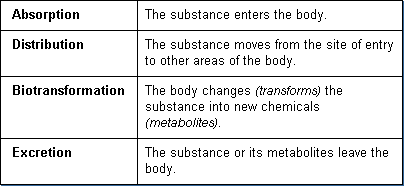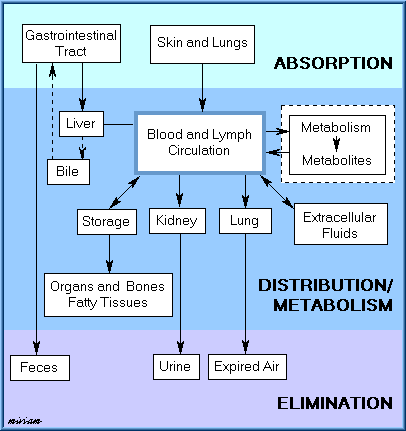|
 |
 |
 |
 |
|
|
|






What is Toxicokinetics?

Toxicokinetics is essentially the study of "how a substance gets into the body and what happens to it in the body". Four processes are involved in toxicokinetics.

The study of the kinetics (movement) of chemicals was originally conducted with pharmaceuticals and thus the term pharmacokinetics became commonly used. In addition, toxicology studies were initially conducted with drugs. However, the science of toxicology has evolved to include environmental and occupational chemicals as well as drugs. Toxicokinetics is thus the appropriate term for the study of the kinetics of all toxic substances.
Frequently the terms toxicokinetics, pharmacokinetics, or disposition may be found in the literature to have the same meaning. Disposition is often used in place of toxicokinetics to describe the time-course of movement of chemicals through the body (that is, how does the body dispose of a xenobiotic?).
The disposition of a toxicant along with its' biological reactivity are the factors that determine the severity of toxicity that results when a xenobiotic enters the body. Specific aspects of disposition of greatest importance are:
 |
 |
 |
|  | duration and concentration of substance at the portal of entry
|
 |
|  | rate and amount that can be absorbed
|
 |
|  | distribution in the body and concentration at specific body sites
|
 |
|  | efficiency of biotransformation and nature of the metabolites
|
 |
|  | the ability of the substance or it's metabolites to pass through cell membranes and come into contact with specific cell components (e.g., DNA).
|
 |
|  | the amount and duration of storage of the substance (or it's metabolites) in body tissues
|
 |
|  | the rate and sites of excretion
|
 |
Examples of how toxicokinetics of a substance can influence its toxicity:
 |
 |
 |
|  | Absorption. A highly-toxic substance, which is poorly absorbed, may be no more of a hazard than a substance of low toxicity that is highly absorbed.
|
 |
|  | Biotransformation. Two substances with equal toxicity and absorption may differ in hazard depending on the nature of their biotransformation. A substance biotransformed into a more toxic metabolite (bioactivated) is a greater hazard than a substance that is biotransformed into a less toxic metabolite (detoxified).
|
 |
Absorption, distribution, biotransformation, and elimination are inter-related processes as illustrated in the following figure.

The toxicokinetics literature is extensive and a listing of all the excellent toxicology and toxicokinetics textbooks is beyond the scope of this tutorial. While other references were occasionally consulted, the textbooks listed below have served as the primary resources for this tutorial.
Basic Toxicology
F. Lu. Taylor & Francis, Washington, D.C.
Casarett and Doull's Toxicology
C. Klaassen, editor. McGraw-Hill Companies, Inc., New York
Essentials of Environmental Toxicology
W. Hughes. Taylor & Francis, Washington D.C.
Essentials of
Anatomy and Physiology
V. C. Scanlon and T. Sanders. F. A. Davis, Philadelphia
Essentials of Human
Anatomy and Physiology
E. N. Marieb. Addison Wesley Longman, Inc. Menlo Park, California
Industrial Toxicology
P. Williams and J. Burson, eds. Van Nostrand Reinhold, New York
Modern Toxicology
E. Hodgson and P. Levi. Elsevier Science Publishing, Co., New York
Principles of Biochemical Toxicology
J. A. Timbrell. Taylor & Francis LTD, London
Principles of Toxicology
K. Stine and T. Brown

  
|
|
|
|